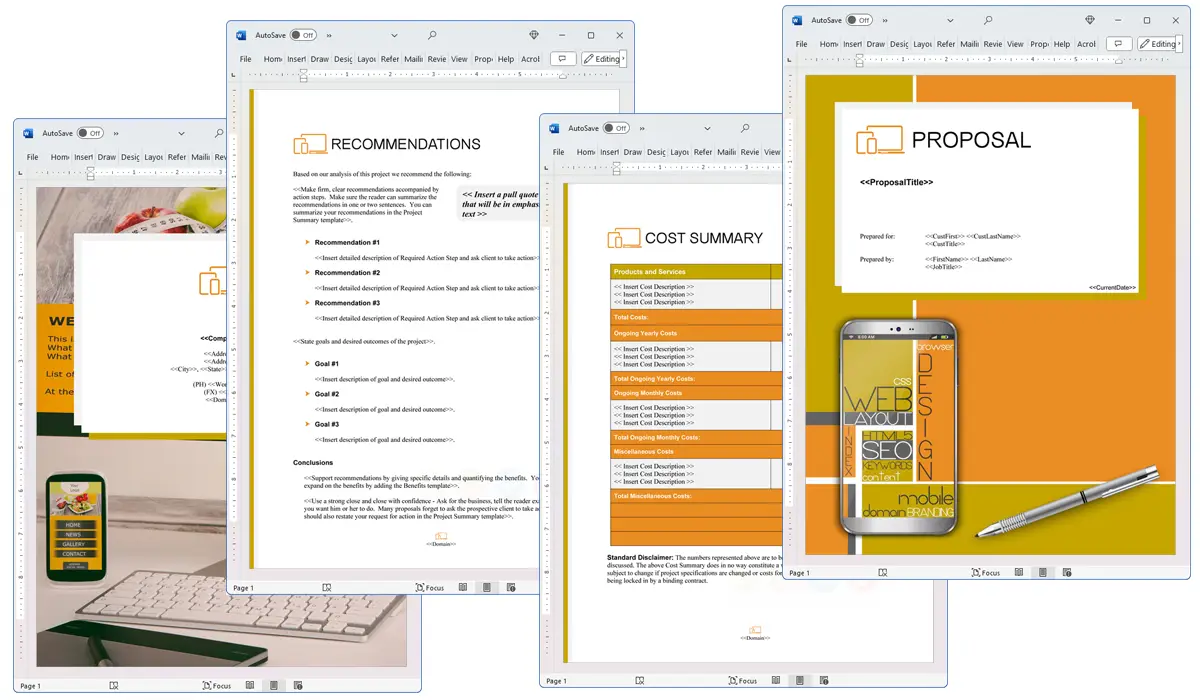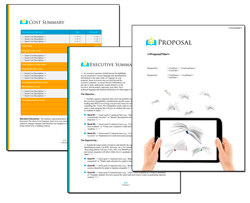What is the Errors and Omissions chapter used for?
Proposal Kit Professional Bundle adds more design themes, all six Contract Packs,
a project management library, and Expert Edition software.

Illustration of Proposal Pack Web #5
We include this Errors and Omissions chapter template in every Proposal Pack, along with thousands more. You assemble this chapter with others in various combinations to create custom-tailored business proposals, plans, reports, and other documents. Proposal Packs apply custom visual designs to the templates, giving the final documents a consistent professional finish.
 DOWNLOADABLE, ONE-TIME COST, NO SUBSCRIPTION FEES
DOWNLOADABLE, ONE-TIME COST, NO SUBSCRIPTION FEES
Overview of the Errors and Omissions Chapter
The Errors and Omissions chapter is a vital part of many business proposals, especially for companies that provide services or advice. This chapter helps to outline the responsibilities and risks associated with the potential mistakes or oversights during the execution of a project or service. It serves as a safeguard, explaining how such errors are handled, the mitigation measures in place, and the extent of liability that the company is willing to accept. Understanding and articulating these points clearly in a proposal reassures potential clients about the professional integrity and risk management protocols of a business.
How is the Errors and Omissions Chapter Used?
In a business proposal, the Errors and Omissions chapter is used to address the potential risks associated with the execution of a project or service. This chapter is particularly crucial for industries where the margin for error is minimal and the consequences of mistakes can be significant. By including this chapter, businesses can transparently discuss how they handle potential mistakes and the insurance coverage that protects against these risks. This not only builds trust with potential clients but also legally protects the business by setting clear expectations about error and omission handling.
What is Included in the Errors and Omissions Chapter?
Typically, the Errors and Omissions chapter includes several key elements:
- Definition of Errors and Omissions: Clarifies what constitutes an error or omission withconsidering the situation of the services provided.
- Risk Management Procedures: Describes the protocols in place to prevent and address errors or omissions.
- Scope of Insurance Coverage: Details the type and extent of insurance coverage that protects against errors and omissions.
- Limitations and Liabilities: Outlines the limits of liability and the responsibilities of both parties in the event of an error or omission.
- Examples of Past Incidences (if applicable): Provides historical context on how previous incidents were handled, reinforcing the effectiveness of risk management strategies.
Use Case Examples for the Errors and Omissions Chapter
- Finance Proposals: For a financial advisory firm, detailing how they protect against erroneous financial advice or investment mishaps.
- Insurance Proposals: Outlining how an insurance company addresses claims mistakes or coverage misunderstandings.
- Legal Proposals: Demonstrating how a law firm manages the repercussions of legal advice that may not result in the desired outcome.
- Consulting Services: Describing the procedures a consultancy has in place for any oversight in the provided advice.
- IT and Software Development: Explaining how errors in coding or software implementation are managed and rectified.
Key Takeaways
- The Errors and Omissions chapter is important for managing potential risks and liabilities associated with business services.
- This chapter builds client trust by transparently addressing how errors are handled and the extent of insurance protection.
- It is crucial for industries where the impact of errors can be significant, such as legal, financial, and consulting services.
- Including detailed descriptions of risk management procedures and insurance coverage is vital.
- Proper use of this chapter in proposals can help in legally safeguarding a business against claims related to errors and omissions.

Illustration of Proposal Pack Books #4
 What Our Clients Say
What Our Clients SayI landed my first big contract using your Proposal Pack. Thank you! I’m the epitome of "small business" (there are just 2 of us) and your proposal pack helped me put together a very professional looking proposal. I did not know where to start and your tech pack [Proposal Pack Tech #1] helped "walk" me through the process. I am looking forward to checking out all the changes you’ve made to the new tech proposal pack and hope to have the opportunity to use it for my next proposal soon!"
NNIS
 4.7 stars, based on 845 reviews
4.7 stars, based on 845 reviewsRelated Chapters

The Errors and Omissions chapter and other chapters are integrated into a Word document as illustrated here in the Proposal Pack Travel #5 design theme. There are hundreds of design themes available, and every design theme includes the Errors and Omissions chapter template.
A proper business proposal will include multiple chapters. This chapter is just one of many you can build into your proposal. We include the complete fill-in-the-blank template in our Proposal Pack template collections. We also include a library of sample proposals illustrating how companies in different industries, both large and small, have written proposals using our Proposal Packs. This template will show you how to write the Errors and Omissions.
We include a chapter library for you to build from based on your needs. All proposals are different and have different needs and goals. Pick the chapters from our collection and organize them as needed for your proposal.
Using the Proposal Pack template library, you can create any business proposal, report, study, plan, or document.
 Ian Lauder has been helping businesses write their proposals and contracts for two decades. Ian is the owner and founder of Proposal Kit, one of the original sources of business proposal and contract software products started in 1997.
Ian Lauder has been helping businesses write their proposals and contracts for two decades. Ian is the owner and founder of Proposal Kit, one of the original sources of business proposal and contract software products started in 1997.By Ian Lauder
 Published by Proposal Kit, Inc.
Published by Proposal Kit, Inc.


 Cart
Cart
 Facebook
Facebook YouTube
YouTube X
X Search Site
Search Site